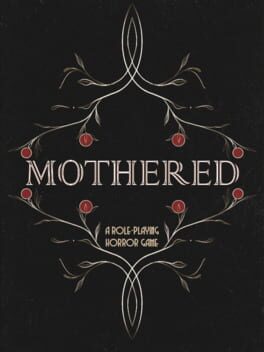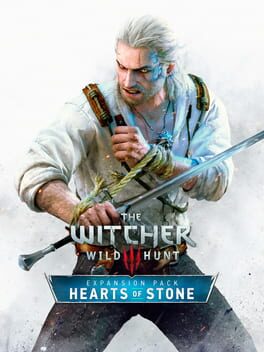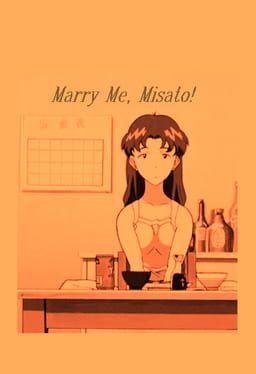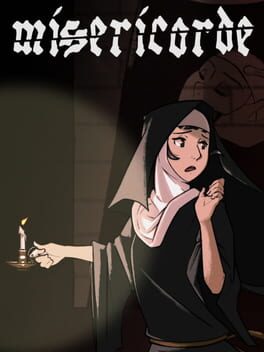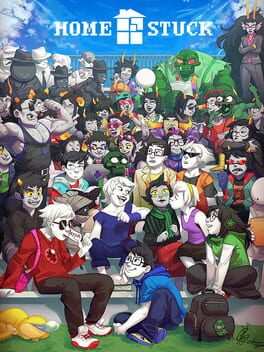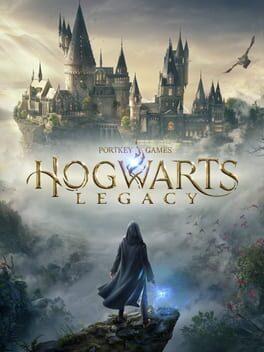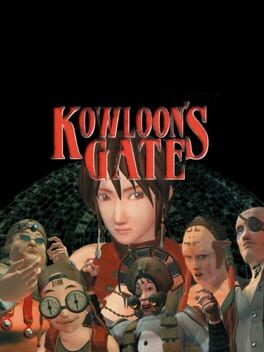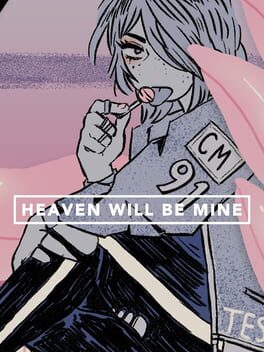katrinavalentina
160 Reviews liked by katrinavalentina
Mothered
2021
To be a copy of a copy.
I'd like to apologize to Mothered, a game that I discounted as being shovelware garbage due solely to me confusing it as an entry in the Remothered series. Mothered has nothing to do with Remothered. They are very distinct games, namely in the fact that Mothered is good and Remothered sucks ass. I'm going to stop typing out these titles now before they lose all meaning. This work, contrary to what I was mistaking it as being a part of, is a well-written and stylish look at parental neglect and the definition of the self. While it certainly stumbles a bit as a game — a lot of tension-free wandering around and clicking everything to see what will advance the plot in the latter half — what is here works, and works well.
I suppose the only way to pull apart this story is by sharing some personal anecdotes. Growing up, I never felt particularly wanted by my parents. This is, broadly speaking, because I wasn't; they weren't ready for the responsibility of taking care of themselves, let alone a child, and they wound up retreating into some bad habits to cope with the loss of the little freedom they had. My mother parentified me, making it my sole responsibility to act as her therapist, saddling me with the responsibility of deciding what she should do about her problems at an age where I didn't have a clue about the world outside of elementary school; my father drank, and smoked, and snorted what he could find, and then he would turn a release valve and let off all of his built-up rage with yelling, and beatings, and by breaking whatever was in his path. I learned quickly that the best thing to be in this situation was useful, and the next best thing after that was to be quiet. Liana, the player character of Mothered, seems to have internalized this same lesson. Her mother remarks with genuine horror at one moment near the finale that Liana won't stop coming after them unless she has an objective. Liana needs busywork. Liana needs to be useful. Liana needs something to keep her quiet. I begin to notice some similarities.
It’s clear from the outset that something is very wrong, though what exactly that something is takes a while before you’re able to start deciphering it. There’s a grand linchpin of the plot that’s hinted to throughout the runtime of the game — error logs being printed to a console, strange commands that come in a voice that doesn’t belong to any character, ambiguity in places where there shouldn’t be any — but I ultimately don’t feel as though the ultimate revelation is the important bit. What Liana is matters less than what Liana isn’t, which is loved. The game, of course, agrees with me in this; the true ending of the game comes to the same conclusion where all is (mostly) made well. Where a sour taste is left in my mouth is in the sense that it’s up to Liana to become deserving of love rather than have it given to her unconditionally, based in no small part due to her family refusing to accept what she is. Then again, nobody ever said horror was supposed to be fair. Sometimes the scariest thing is not to be believed. I still have nightmares rooted in the fear of people not believing me, of thinking that I’m hysterical, all while some lurching evil grows closer with every passing moment.
That would suggest that this game is really only scary in a narrative sense, which would be incorrect. While I like to fashion myself as a big tough man who doesn't scare easily, there are a select few horror games that tend to make me curl up. This is one of those. While the daytime sections are very open, with these beautiful rays of orange light glittering though the autumn leaves, the same cannot be said for when it gets dark. Everything gets more wrong the more the sun sets. Your brother, tucked away so deep in his bedroom that you can’t ever see him, will start to tell you how your mother has been lying to you. Your mother will stand stark still at the far end of a pitch-black hallway, waiting for you in complete silence. You’ll try to sleep and get a warning that you can’t sleep with someone else in the room, and it’s not until you go to turn on the light that you find your mother shrouded in darkness, almost as though she was hoping you wouldn’t notice her there. Sometimes mother's animations are smooth, other times they're jittery, other times they don't happen at all. There are places that you're forbidden from going under threat (at least, implied threat) of death. Your father lies about talking on the phone with you to his co-workers, pretending that you're his wife rather than his daughter. This house is not a home. More importantly, it isn't your home.
The greatest twist underlying all of this is, in actuality, the fact that this all ties into a series of games that Enigma Studio are putting out. It's not just an anthology, either; all of these titles are connected and part of a greater ARG that links all of them together, with info being locked behind entirely different games and requiring certain registry files to access a secret portion of Haunted PS1's Demo Disk: Spectral Mall. I don't especially care about any of this, and the good news is that it doesn't detract from the base game of Mothered in the slightest. The pseudo-sequel, Mothered: Home, does require heavy investment in the broader idea of the Enigma Machine universe, so I wouldn't recommend getting into it unless you're one of either desperate for more of this or curious to dig your fingers into an ARG. It's ignorable, though, and ignoring it is what I'm going to continue doing.
My gripes are minimal. I do think that spots like the barn and the end of the road tend to be placed a bit too far away relative to how fast your character's maximum run speed is. The slow character speed works great for building up tension when you're inside the house, but when you're in a big, open field during the daytime and there's nothing going on, it serves only as a pace killer. People have complained about the apple collecting section enough for me to know there isn't much juice left in the discussion, but it does take too long and the apples are too hard to spot. None of this is terrible, but in a game that's so tightly paced everywhere else, these little missteps stick out all the more obviously.
Aside from that, this is a strong showing. I'm not certain if I'll dig too much deeper into the creator's related games — I don't really think that what's being advertised in those is going to be what I came to this for — but I'm very glad to have played this all the same. As a standalone project, this is impressive. It's in the Palestinian Relief Bundle if you've already bought that, and it'll be going for about another week from the date of posting if you haven't.
Be with mother.
I'd like to apologize to Mothered, a game that I discounted as being shovelware garbage due solely to me confusing it as an entry in the Remothered series. Mothered has nothing to do with Remothered. They are very distinct games, namely in the fact that Mothered is good and Remothered sucks ass. I'm going to stop typing out these titles now before they lose all meaning. This work, contrary to what I was mistaking it as being a part of, is a well-written and stylish look at parental neglect and the definition of the self. While it certainly stumbles a bit as a game — a lot of tension-free wandering around and clicking everything to see what will advance the plot in the latter half — what is here works, and works well.
I suppose the only way to pull apart this story is by sharing some personal anecdotes. Growing up, I never felt particularly wanted by my parents. This is, broadly speaking, because I wasn't; they weren't ready for the responsibility of taking care of themselves, let alone a child, and they wound up retreating into some bad habits to cope with the loss of the little freedom they had. My mother parentified me, making it my sole responsibility to act as her therapist, saddling me with the responsibility of deciding what she should do about her problems at an age where I didn't have a clue about the world outside of elementary school; my father drank, and smoked, and snorted what he could find, and then he would turn a release valve and let off all of his built-up rage with yelling, and beatings, and by breaking whatever was in his path. I learned quickly that the best thing to be in this situation was useful, and the next best thing after that was to be quiet. Liana, the player character of Mothered, seems to have internalized this same lesson. Her mother remarks with genuine horror at one moment near the finale that Liana won't stop coming after them unless she has an objective. Liana needs busywork. Liana needs to be useful. Liana needs something to keep her quiet. I begin to notice some similarities.
It’s clear from the outset that something is very wrong, though what exactly that something is takes a while before you’re able to start deciphering it. There’s a grand linchpin of the plot that’s hinted to throughout the runtime of the game — error logs being printed to a console, strange commands that come in a voice that doesn’t belong to any character, ambiguity in places where there shouldn’t be any — but I ultimately don’t feel as though the ultimate revelation is the important bit. What Liana is matters less than what Liana isn’t, which is loved. The game, of course, agrees with me in this; the true ending of the game comes to the same conclusion where all is (mostly) made well. Where a sour taste is left in my mouth is in the sense that it’s up to Liana to become deserving of love rather than have it given to her unconditionally, based in no small part due to her family refusing to accept what she is. Then again, nobody ever said horror was supposed to be fair. Sometimes the scariest thing is not to be believed. I still have nightmares rooted in the fear of people not believing me, of thinking that I’m hysterical, all while some lurching evil grows closer with every passing moment.
That would suggest that this game is really only scary in a narrative sense, which would be incorrect. While I like to fashion myself as a big tough man who doesn't scare easily, there are a select few horror games that tend to make me curl up. This is one of those. While the daytime sections are very open, with these beautiful rays of orange light glittering though the autumn leaves, the same cannot be said for when it gets dark. Everything gets more wrong the more the sun sets. Your brother, tucked away so deep in his bedroom that you can’t ever see him, will start to tell you how your mother has been lying to you. Your mother will stand stark still at the far end of a pitch-black hallway, waiting for you in complete silence. You’ll try to sleep and get a warning that you can’t sleep with someone else in the room, and it’s not until you go to turn on the light that you find your mother shrouded in darkness, almost as though she was hoping you wouldn’t notice her there. Sometimes mother's animations are smooth, other times they're jittery, other times they don't happen at all. There are places that you're forbidden from going under threat (at least, implied threat) of death. Your father lies about talking on the phone with you to his co-workers, pretending that you're his wife rather than his daughter. This house is not a home. More importantly, it isn't your home.
The greatest twist underlying all of this is, in actuality, the fact that this all ties into a series of games that Enigma Studio are putting out. It's not just an anthology, either; all of these titles are connected and part of a greater ARG that links all of them together, with info being locked behind entirely different games and requiring certain registry files to access a secret portion of Haunted PS1's Demo Disk: Spectral Mall. I don't especially care about any of this, and the good news is that it doesn't detract from the base game of Mothered in the slightest. The pseudo-sequel, Mothered: Home, does require heavy investment in the broader idea of the Enigma Machine universe, so I wouldn't recommend getting into it unless you're one of either desperate for more of this or curious to dig your fingers into an ARG. It's ignorable, though, and ignoring it is what I'm going to continue doing.
My gripes are minimal. I do think that spots like the barn and the end of the road tend to be placed a bit too far away relative to how fast your character's maximum run speed is. The slow character speed works great for building up tension when you're inside the house, but when you're in a big, open field during the daytime and there's nothing going on, it serves only as a pace killer. People have complained about the apple collecting section enough for me to know there isn't much juice left in the discussion, but it does take too long and the apples are too hard to spot. None of this is terrible, but in a game that's so tightly paced everywhere else, these little missteps stick out all the more obviously.
Aside from that, this is a strong showing. I'm not certain if I'll dig too much deeper into the creator's related games — I don't really think that what's being advertised in those is going to be what I came to this for — but I'm very glad to have played this all the same. As a standalone project, this is impressive. It's in the Palestinian Relief Bundle if you've already bought that, and it'll be going for about another week from the date of posting if you haven't.
Be with mother.
Faust meets Witcher in one of the most deeply tragic and moving love stories of all time. Hearts of Stone is more than just a love story; it is also an interrogation of love, seeking to both affirm love and understand its proclivity for destruction when left unchecked. It retells an age-old story, but it does so in a way that excellently demonstrates The Witcher's almost supernatural ability to transform simple story concepts into some of the most intricate and riveting studies of the human condition ever seen.
Marry Me, Misato!
2005
Cyberpunk 2077
2020
A murder mystery VN set in a 1482 monastary (kinda reminds me of Pentiment actually but more of a direct kinetic novel than that was). As a “Volume One” entry the central mystery it’s building toward is sadly left incomplete for now, but I would highly recommend it on its own anyway as its character writing and presentation really set it apart
While the cast overall is pretty compelling, it’s the protagonist that really makes this for me. Centered on Hedwig, an Anchoress who lived most of her life in total isolation, who’s suddenly forced out her cell by her Superior and given the goal of secretly trying to solve the murder of one of the convent’s Sisters. What makes Misericorde really interesting so far is not exactly the mystery itself (though the potential is definitely there), but seeing how completely unprepared Hedwig is for such a task and having to overcome her poor social skills as a result. Her internal dialogue is really well written and descriptive, watching her clash so heavily with trying to interact with the other Sisters while also playing a “detective” really makes her compelling to follow
This VN also looks and sounds really cool. The use of a monochrome aesthetic for the sprites and (I’m assuming) real photos as the backgrounds works really well in giving the monastery an unsettling gothic atmosphere. And while there’s no voice acting the music is excellent too, kind of hard to describe but it’s like lo-fi or trip hop sounding which seems like an odd mix but it’s actually very fitting
My feelings on it may change when I can think on it as a whole, but as is it’s really good and I’m very excited to see how it continues for Volume Two. Shows a lot of promise if it can pay off from all the build up
While the cast overall is pretty compelling, it’s the protagonist that really makes this for me. Centered on Hedwig, an Anchoress who lived most of her life in total isolation, who’s suddenly forced out her cell by her Superior and given the goal of secretly trying to solve the murder of one of the convent’s Sisters. What makes Misericorde really interesting so far is not exactly the mystery itself (though the potential is definitely there), but seeing how completely unprepared Hedwig is for such a task and having to overcome her poor social skills as a result. Her internal dialogue is really well written and descriptive, watching her clash so heavily with trying to interact with the other Sisters while also playing a “detective” really makes her compelling to follow
This VN also looks and sounds really cool. The use of a monochrome aesthetic for the sprites and (I’m assuming) real photos as the backgrounds works really well in giving the monastery an unsettling gothic atmosphere. And while there’s no voice acting the music is excellent too, kind of hard to describe but it’s like lo-fi or trip hop sounding which seems like an odd mix but it’s actually very fitting
My feelings on it may change when I can think on it as a whole, but as is it’s really good and I’m very excited to see how it continues for Volume Two. Shows a lot of promise if it can pay off from all the build up
Homestuck
2009
Homestuck
2009
Policy
-----------------------------------------------------------
I woke up with this strange craving to play through Homestuck to completion this time after having the jingle of one of the songs pervade my sleep. So I'm making a decision to enter this rabbit hole again.
I read Homestuck about 6 years ago to around page mark 4000 or so. I believe this was roughly far enough in the story that I met the highly charismatic and quite lore complex Trolls but I believe I had stopped due to the investigation intermission I was on wearing me down. Now I've decided to try carving through this Text again so I figured I would give a small reflection on it.
For one, I want to start off by settling that Homestuck is actually more of a game than even most Kinetic Visual Novels. You see while a majority of the text does function as a Kinetic Visual Novel, there are various hyperlinks you can click on throughout the journey that meander you into nonsense. For example when speaking about Betty Crocker's aroma on the reread you can click a link that takes you to the Betty Crocker wikipedia page.
Most of the links tend more substantial than just this. But regardless it reveals the first cultural button that Homestuck is pushing on, the idea that its own text is embedded in relation to a lot of texts around it which are themselves constantly moving. This process of change of evolution is reflected in the massive amount of fan content and the fact that there has been more and more fan participation in the story. Up until now, we usually think about the effects of fan participation as an audience as something hostile and oppressive, one of the most notable examples being the re utilization of death threats that Hideki Anno recycled into End of Evangelion. By comparison, perhaps in part due to the playful and immature tone of the work, Homestuck's fan participation for a long time remained frenzied but relatively warm. Originally I was under the impression that Homestuck's fandom didnt have a whole lot of controversy and that Andrew Hussie was mostly ok, but upon reading a couple articles I realized that there is litigations going on, and the Hussie quite frankly sees himself as a reluctant cult leader now. I think the intelligence with which he speaks about it here is telling:
“The content vacuum created by a cryptid leader results in overwhelming conditions of parasociality, and the projections of personality, morality, and biographical data onto the blank-slate leader can get ludicrous, and often pretty spiteful. Then again, depending on the atmosphere of any given moment in fandom, there may be at least as many simps projecting absurd deification fantasies on the leader.”
source
What I find so impressive about this is how it seems to show something that I picked up in what I read and am aware of when it comes to Homestuck itself: This terminally online lingo is culturally accepted and then utilized in order to tell a more immediately accurate story. While it keeps hands off with just simple teenaged irc interactions early on, people saying 'thats boring bro', it slowly billows out more and more into niche internet slang and technologized thinking especially once the trolls become involved.
It's particularly for these later parts of the story I'm interested in reading to, and in particular want to prime myself for some of the spinoff content: Psycholonials, HiveSwap. Along with the late game embedded in the work itself Alterniabound. But I will say that the humor and direction of early homestuck does actually amuse me.
One of the most startlingly effective things about how Homestuck functions is that it will spend a lot of time with its characters fumbling around to figure out what to do. Characters will stand around jamming items into each other and getting confused with how their own interaction systems (called Capchalogues). I always thought these meandering moments were really entertaining as they call back to not knowing what to do in a point and click game. On top of that the rich mess of the environments and rooms of most of the characters is relatable, having shit just littered all over the floor and constantly sorting through it is how a lot of people online including myself tend to live, but also shows a skill in environmental storytelling that backs up a lot of the more dialogue heavy portions of the game. I was complaining recently how most visual novels tend to perform description through internal monologue, so the lack of focus on internal monologue here is going to help my reading a lot.
I think a lot of people on here are critical of this for being only either 'technically a game' or plastering it in a teenaged nostalgia about how they played it, but will probably never play it again. Honestly I can't help but find both of these approaches somewhat uncritical and tedious. While there's no impression on people to do anything I think referencing the text via nostalgia from what I understand of it does it a huge disservice to the primary themes of change and hyper-subjectivity. While perhaps rereading the whole thing is untenable for most depending on life circumstance, flipping the book back to your favourite moments or scenes or quotations does a lot to keep you tethered to the identity with a work, rather than just throwing it on like a hat when it suits you. For example, i'll throw on random episodes of MLP to help keep my memory with the main work sharpened. On whether or not its a game point, I just find this so frankly ridiculous. The failstate is not finishing the damn thing which a LOT of people have done. Also visual novels by their digital design are games, so this is also a game.
The fact is, I hear a lot about how I should read homestuck but a lot less rather why or what it means to the person in particular. Perhaps this short circuited nature is exactly what Hussie is referencing here and has a right to do so. Eventually people will 'wake up' from the cult and disavow from it etc. But the glamour of the music has also pierced out to me, with Toby Fox even having apparently done the music for certain parts. I'm excited to hear that music in its original format all other things aside.
That's why I plan to reread and actually finish Homestuck this time. I figured I'd leave a note here going in on my previous impressions and positive feelings towards the work. If it's somewhat dry and unspecific in relating to character dialogue I would understand, I really remember really liking Dirk Strider and his awesome sunglasses. A lot of people say I'm like a femme Dirk Strider sometimes so that makes sense. I also really like Nepeta's whole catgirl aesthetic is cute and her desire for roleplay is so fun.
Anyway I learned also that if you have any interest in playing the game now, the browser version is a bit busted and the sound no longer works. So it's best to download it from here. If all goes well expect another write up down the chute here soon.
-----------------------------------------------------------
I woke up with this strange craving to play through Homestuck to completion this time after having the jingle of one of the songs pervade my sleep. So I'm making a decision to enter this rabbit hole again.
I read Homestuck about 6 years ago to around page mark 4000 or so. I believe this was roughly far enough in the story that I met the highly charismatic and quite lore complex Trolls but I believe I had stopped due to the investigation intermission I was on wearing me down. Now I've decided to try carving through this Text again so I figured I would give a small reflection on it.
For one, I want to start off by settling that Homestuck is actually more of a game than even most Kinetic Visual Novels. You see while a majority of the text does function as a Kinetic Visual Novel, there are various hyperlinks you can click on throughout the journey that meander you into nonsense. For example when speaking about Betty Crocker's aroma on the reread you can click a link that takes you to the Betty Crocker wikipedia page.
Most of the links tend more substantial than just this. But regardless it reveals the first cultural button that Homestuck is pushing on, the idea that its own text is embedded in relation to a lot of texts around it which are themselves constantly moving. This process of change of evolution is reflected in the massive amount of fan content and the fact that there has been more and more fan participation in the story. Up until now, we usually think about the effects of fan participation as an audience as something hostile and oppressive, one of the most notable examples being the re utilization of death threats that Hideki Anno recycled into End of Evangelion. By comparison, perhaps in part due to the playful and immature tone of the work, Homestuck's fan participation for a long time remained frenzied but relatively warm. Originally I was under the impression that Homestuck's fandom didnt have a whole lot of controversy and that Andrew Hussie was mostly ok, but upon reading a couple articles I realized that there is litigations going on, and the Hussie quite frankly sees himself as a reluctant cult leader now. I think the intelligence with which he speaks about it here is telling:
“The content vacuum created by a cryptid leader results in overwhelming conditions of parasociality, and the projections of personality, morality, and biographical data onto the blank-slate leader can get ludicrous, and often pretty spiteful. Then again, depending on the atmosphere of any given moment in fandom, there may be at least as many simps projecting absurd deification fantasies on the leader.”
source
What I find so impressive about this is how it seems to show something that I picked up in what I read and am aware of when it comes to Homestuck itself: This terminally online lingo is culturally accepted and then utilized in order to tell a more immediately accurate story. While it keeps hands off with just simple teenaged irc interactions early on, people saying 'thats boring bro', it slowly billows out more and more into niche internet slang and technologized thinking especially once the trolls become involved.
It's particularly for these later parts of the story I'm interested in reading to, and in particular want to prime myself for some of the spinoff content: Psycholonials, HiveSwap. Along with the late game embedded in the work itself Alterniabound. But I will say that the humor and direction of early homestuck does actually amuse me.
One of the most startlingly effective things about how Homestuck functions is that it will spend a lot of time with its characters fumbling around to figure out what to do. Characters will stand around jamming items into each other and getting confused with how their own interaction systems (called Capchalogues). I always thought these meandering moments were really entertaining as they call back to not knowing what to do in a point and click game. On top of that the rich mess of the environments and rooms of most of the characters is relatable, having shit just littered all over the floor and constantly sorting through it is how a lot of people online including myself tend to live, but also shows a skill in environmental storytelling that backs up a lot of the more dialogue heavy portions of the game. I was complaining recently how most visual novels tend to perform description through internal monologue, so the lack of focus on internal monologue here is going to help my reading a lot.
I think a lot of people on here are critical of this for being only either 'technically a game' or plastering it in a teenaged nostalgia about how they played it, but will probably never play it again. Honestly I can't help but find both of these approaches somewhat uncritical and tedious. While there's no impression on people to do anything I think referencing the text via nostalgia from what I understand of it does it a huge disservice to the primary themes of change and hyper-subjectivity. While perhaps rereading the whole thing is untenable for most depending on life circumstance, flipping the book back to your favourite moments or scenes or quotations does a lot to keep you tethered to the identity with a work, rather than just throwing it on like a hat when it suits you. For example, i'll throw on random episodes of MLP to help keep my memory with the main work sharpened. On whether or not its a game point, I just find this so frankly ridiculous. The failstate is not finishing the damn thing which a LOT of people have done. Also visual novels by their digital design are games, so this is also a game.
The fact is, I hear a lot about how I should read homestuck but a lot less rather why or what it means to the person in particular. Perhaps this short circuited nature is exactly what Hussie is referencing here and has a right to do so. Eventually people will 'wake up' from the cult and disavow from it etc. But the glamour of the music has also pierced out to me, with Toby Fox even having apparently done the music for certain parts. I'm excited to hear that music in its original format all other things aside.
That's why I plan to reread and actually finish Homestuck this time. I figured I'd leave a note here going in on my previous impressions and positive feelings towards the work. If it's somewhat dry and unspecific in relating to character dialogue I would understand, I really remember really liking Dirk Strider and his awesome sunglasses. A lot of people say I'm like a femme Dirk Strider sometimes so that makes sense. I also really like Nepeta's whole catgirl aesthetic is cute and her desire for roleplay is so fun.
Anyway I learned also that if you have any interest in playing the game now, the browser version is a bit busted and the sound no longer works. So it's best to download it from here. If all goes well expect another write up down the chute here soon.
Hogwarts Legacy
2023
Drakengard
2003
Kowloon's Gate
1997
“Wannin are—how should I put this—a human that has become half-object. There’s no other way to explain it. Well, then why are they called wannin? When someone becomes a wannin they have to keep thinking they’re no longer human, but an object; they must have delusions. If those delusions run out they’ll become an object instantly, and completely.
That is to say, continuing their delusions is proof that they’re half-human.”
Kowloon’s Gate is a game that I’ve been interested in since I first saw its name in a collection of PS1 isos. Feng Shui? The Kowloon Walled City? 4 discs named after the Four Symbols? It was immediately interesting to me, and only became more so after I saw images from the game. I only had good impressions, so how was the actual game?
Well, it’s good, there’s some issues, but no more than the average adventure game, and they don’t really bring it down too much. It’s really surprising how mundane the issues for this game are, all things considered: I’ve experienced more surreal gameplay issues in low-budget brawlers. A couple simple flaws you’ll observe early on: incredibly slow movement in the JPEG dungeons (the non-combat pre-rendered sections,) annoying specific dialogue flags in the JPEG dungeons that block off progress, and the navigator holding your dick so hard in the first real-time dungeon that you might as well not be exploring. The latter thankfully resolves itself after the first dungeon, since the later dungeons have more complex layout, but the former two remain throughout the game. Thank god Kowloon’s Front is destined to go to hell and die.
Anyway, the gameplay foibles for me were fairly minor. I can see people possibly being annoyed by the real-time dungeons since the gameplay is fairly basic (you attack weaknesses based off of wuxing,) and the dungeons are labyrinthine, but I thought they were a nice breather from meandering and dialogue-heavy JPEG dungeons. The main draw for this game is its story and art, so I’ll move to that now (well the story, I don’t have any ability to judge the art, besides saying I like it.)
I like the story of Kowloon’s Gate. A story, in part, about fate and destiny works very well with the linearity of an adventure game. Even if the protagonist changes every area they enter within the game, since you’re pretty clearly told what you need to do, it very rarely feels like something that you actually did of your own free will. The lack of puzzles might be a little disappointing, but it helps the story move along in several ways here: mainly, it allows for the game to go on philosophical tangents without much risk of the player getting too lost thinking about what it would be like to be an electric fan.
So, in effect I would say there’s two major aspects of Kowloon’s Gate story: the surface story you’re given at the beginning about restoring balance to the to worlds of Yin and Yang, and finding the Four Symbols, and then the more esoteric aspects like wannin, minli and so on. The former is effectively the vessel of the story, and the latter is the cloudy narrative liquid that resides within it. Part of one whole but distinct from one another, so the story ends up being simple and at the same time complex. Thematic! The general formula for the narrative is that you enter an area, scout around, find out there’s a problem, some guy hints that an item you got 1-3 hours ago can turn the problem into dust, some philosophy, some dungeon crawling, you find the problem and use said item to turn it into dust. Rinse and repeat until the end of the game.
Perhaps a little reductive, but it was a contrast I found difficult to ignore. For every bit like the start of this review, there’s another where someone tells you that the evil guy in your way is weak to wigs, and can be defeated easily if you have one. Personally, my favorite part of all of it was the wannin. Since being a wannin isn’t exactly a good or bad thing, you get a wide variety of wannin characters. Besides that, the wannin designs are interesting, and I like the odd metaphysical position the story places them in.
Anyway, that’s it for 2023 I suppose. Pretty good end to the year, maybe it’s for the best that I took a long ass time finishing this game.
Supplemental information for the initial quote: since wannin must have delusions (妄想) to live they are as a result, wannin.(妄人) The first character in the word for delusion+person. This is spelled out more clearly in the rest of the page past where I ended, but I preferred leaving it where I did.
That is to say, continuing their delusions is proof that they’re half-human.”
Kowloon’s Gate is a game that I’ve been interested in since I first saw its name in a collection of PS1 isos. Feng Shui? The Kowloon Walled City? 4 discs named after the Four Symbols? It was immediately interesting to me, and only became more so after I saw images from the game. I only had good impressions, so how was the actual game?
Well, it’s good, there’s some issues, but no more than the average adventure game, and they don’t really bring it down too much. It’s really surprising how mundane the issues for this game are, all things considered: I’ve experienced more surreal gameplay issues in low-budget brawlers. A couple simple flaws you’ll observe early on: incredibly slow movement in the JPEG dungeons (the non-combat pre-rendered sections,) annoying specific dialogue flags in the JPEG dungeons that block off progress, and the navigator holding your dick so hard in the first real-time dungeon that you might as well not be exploring. The latter thankfully resolves itself after the first dungeon, since the later dungeons have more complex layout, but the former two remain throughout the game. Thank god Kowloon’s Front is destined to go to hell and die.
Anyway, the gameplay foibles for me were fairly minor. I can see people possibly being annoyed by the real-time dungeons since the gameplay is fairly basic (you attack weaknesses based off of wuxing,) and the dungeons are labyrinthine, but I thought they were a nice breather from meandering and dialogue-heavy JPEG dungeons. The main draw for this game is its story and art, so I’ll move to that now (well the story, I don’t have any ability to judge the art, besides saying I like it.)
I like the story of Kowloon’s Gate. A story, in part, about fate and destiny works very well with the linearity of an adventure game. Even if the protagonist changes every area they enter within the game, since you’re pretty clearly told what you need to do, it very rarely feels like something that you actually did of your own free will. The lack of puzzles might be a little disappointing, but it helps the story move along in several ways here: mainly, it allows for the game to go on philosophical tangents without much risk of the player getting too lost thinking about what it would be like to be an electric fan.
So, in effect I would say there’s two major aspects of Kowloon’s Gate story: the surface story you’re given at the beginning about restoring balance to the to worlds of Yin and Yang, and finding the Four Symbols, and then the more esoteric aspects like wannin, minli and so on. The former is effectively the vessel of the story, and the latter is the cloudy narrative liquid that resides within it. Part of one whole but distinct from one another, so the story ends up being simple and at the same time complex. Thematic! The general formula for the narrative is that you enter an area, scout around, find out there’s a problem, some guy hints that an item you got 1-3 hours ago can turn the problem into dust, some philosophy, some dungeon crawling, you find the problem and use said item to turn it into dust. Rinse and repeat until the end of the game.
Perhaps a little reductive, but it was a contrast I found difficult to ignore. For every bit like the start of this review, there’s another where someone tells you that the evil guy in your way is weak to wigs, and can be defeated easily if you have one. Personally, my favorite part of all of it was the wannin. Since being a wannin isn’t exactly a good or bad thing, you get a wide variety of wannin characters. Besides that, the wannin designs are interesting, and I like the odd metaphysical position the story places them in.
Anyway, that’s it for 2023 I suppose. Pretty good end to the year, maybe it’s for the best that I took a long ass time finishing this game.
Supplemental information for the initial quote: since wannin must have delusions (妄想) to live they are as a result, wannin.(妄人) The first character in the word for delusion+person. This is spelled out more clearly in the rest of the page past where I ended, but I preferred leaving it where I did.
Metal Gear Solid
1998
Heaven Will Be Mine
2018
Drakengard
2003
Signalis
2022
Minor spoilers ahead? But probably worth knowing?:
Hey, game designers! If you're going to do a fakeout ending, please signpost it in literally any way! This game signified absolutely in no way that its fake ending was actually fake. Myself and at least 3 other people I've talked to about it fell for it. The credits played in full and I literally uninstalled the game after it because I straight up thought it was over. I only found out that I hadn't actually finished the game because I tried looking up alternate endings and everything was completely foreign! Please just tell me in any clear way that I'm not done please?
Hey, game designers! If you're going to do a fakeout ending, please signpost it in literally any way! This game signified absolutely in no way that its fake ending was actually fake. Myself and at least 3 other people I've talked to about it fell for it. The credits played in full and I literally uninstalled the game after it because I straight up thought it was over. I only found out that I hadn't actually finished the game because I tried looking up alternate endings and everything was completely foreign! Please just tell me in any clear way that I'm not done please?
